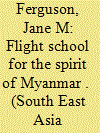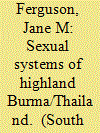| Srl | Item |
| 1 |
ID:
161646


|
|
|
|
|
| Summary/Abstract |
In 1935, two Burmese filmmakers traveled to Tokyo with the intention of acquiring the latest sound recording equipment and training in sound-on-film production. In addition to these stated goals, in Japan they co-produced the feature film Japan Yin Thwe/Nippon Musume, ‘Japanese Darling.’ The film depicts daring young Burmese aviators and a budding romance with a Japanese woman. The active harnessing of the symbolic capital of aviation – the ideological notion of airmindedness – through the mimetic capacities of cinema, could be seen as a prescient example of Pan-Asianism, predating Daitoa Kyoeiken ‘Greater East-Asia Co-Prosperity Sphere’ propaganda. The film’s explicit encouragement of Burmese techno-nationalism offers a compelling contrast to other examples of anti-colonial nationalism, which emphasize notions of ethnic history and Buddhist morality and concerns of religious decline in the face of foreign imperialism. However, a comprehensive analysis of the film industry and commercial aviation in Japan in the 1930s reveals a structural impetus for this collaboration, arguably overshadowing ideological motivations and results.
|
|
|
|
|
|
|
|
|
|
|
|
|
|
|
|
| 2 |
ID:
130573


|
|
|
|
|
| Publication |
2014.
|
| Summary/Abstract |
The author examines the context and experiences of Shan migrants from Burma regarding men who work in male host clubs in Chiang Mai, northern Thailand. While Shan commercial sex workers in Thailand often have cultural understandings of gender and sexual categories in the Shan and Burmese context, their direct experience in performing sexuality takes place in Thailand, and is economically mediated. This study seeks to answer two questions. First, to what extent do migrant Shans ascribe specific sexual and gender comportment to Thai cultural practices? Second, how might engagement with a gay commercial sex industry affect how these Shan men remember and relate to gender and sexual categories back in the Shan state in Burma? As ethnographic evidence shows, Shan male sex workers are able to adapt to certain cultural aspects of Thai ke [gay] identity, but they posit their own masculinity against former familiar categories of sexuality and gender.
|
|
|
|
|
|
|
|
|
|
|
|
|
|
|
|